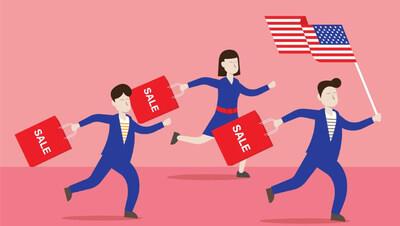
Will Tariff-Induced Supply Chain Unpredictability Grinch-Ify 'Christmas In July'?
Store Brands and American-Made Goods Will Be Featured
One step retailers will take during the big July sales is promoting their own branded products and American-made goods as their biggest deals, since these products are less susceptible to the vagaries of tariffs. Amazon has already signaled this in its 2025 Prime Day advertising campaign. Amazon's in-house brands, like its subscription services Kindle Unlimited and Audible, Fire tablets and Echo devices, are featured in their promotions for this year's event.
"Expect other retailers holding sales to respond similarly," Abdulla says. "Also, sellers could emphasize 'Made in the USA' goods from independent producers, which likewise are not affected by tariffs. This could add the allure of appealing to buyers' sense of patriotism."
Buyer, Beware - and Prepare
Abdulla notes that Prime Day's success is partly driven by advanced dynamic pricing algorithms and compulsive purchase-inducing tactics, so consumers should be alert to retailers' attempts to make deals look better than they are. Promotions like Lightning Deals and Prime Exclusive Discounts may show a higher "original price" as an anchor, leading to a perception of deal being better than it actually is.
"Households' discretionary funds are under pressure, so I recommend consumers perform their due diligence," Abdulla advises. "Don't accept ads at face value. Use price comparison tools and look for alternatives across various retailers to find the best deals. I expect deals will be scrutinized more anyway, as consumers may suspect that the prices are already 'tariff adjusted.'"
Also, be prepared for potential disappointments with the size of markdowns for this year's July sales. Tariffs may make it harder for sellers to offer good because of cost and inventory pressures.
"They may offer less aggressive discounts than in previous years to mitigate the impact of expected tariffs on their profit margins," Abdulla says. "Further, unsure if they will be able to replenish their stocks later, some sellers may hold back inventory to sell at full or increased prices later, rather than offering deep discounts during Prime Day."
When You See a Real Deal, Take It
With less consumer confidence in the economy and more wariness about the value of advertised deals, Abdulla thinks consumers will be hesitant to splurge on impulse buys and will be more deliberate in their shopping strategies, likely focusing more on essential goods. Some advertised deals may be a fit for that strategy. Target, for instance, is advertising that it will sell essential schools supplies at 2024 prices.
"Consumers could use Amazon's Prime Day and its rivals' counterparts as an opportunity to stock up on needed items or products they anticipate will become more expensive later in the year due to looming tariff concerns," Abdulla says.
Return to Seller
With their July sales events' extended hours, Amazon and other sellers give buyers more time to buy their wares, which the retailers hope will increase revenues. However, there is a downside to the expanded purchase window.
"Yes, increasing the number of days the sales run could lead to consumers buying more goods," Abdulla says. "But the more goods consumers buy, the more possibilities there are that they will be dissatisfied with some of their purchases, which could cause an increase in returns."
Other factors may come into play as well, even if more consumers buy only essential goods. During Christmas in July, retailers will still be applying proven techniques to entice consumers into buying products they usually wouldn't. If they do make impulse purchases, buyers' remorse may set in later.
"Consumers who were borderline about their selections may become even more likely to return the purchased items once they have a chance to think about it," Abdulla says. "This is likely to hurt sellers, given already squeezed margins and the need to absorb deep discounts, as well as processing costs for returns."
SOURCE University of Tennessee on behalf of its Haslam College of Business

Legal Disclaimer:
MENAFN provides the
information “as is” without warranty of any kind. We do not accept
any responsibility or liability for the accuracy, content, images,
videos, licenses, completeness, legality, or reliability of the information
contained in this article. If you have any complaints or copyright
issues related to this article, kindly contact the provider above.


















Comments
No comment